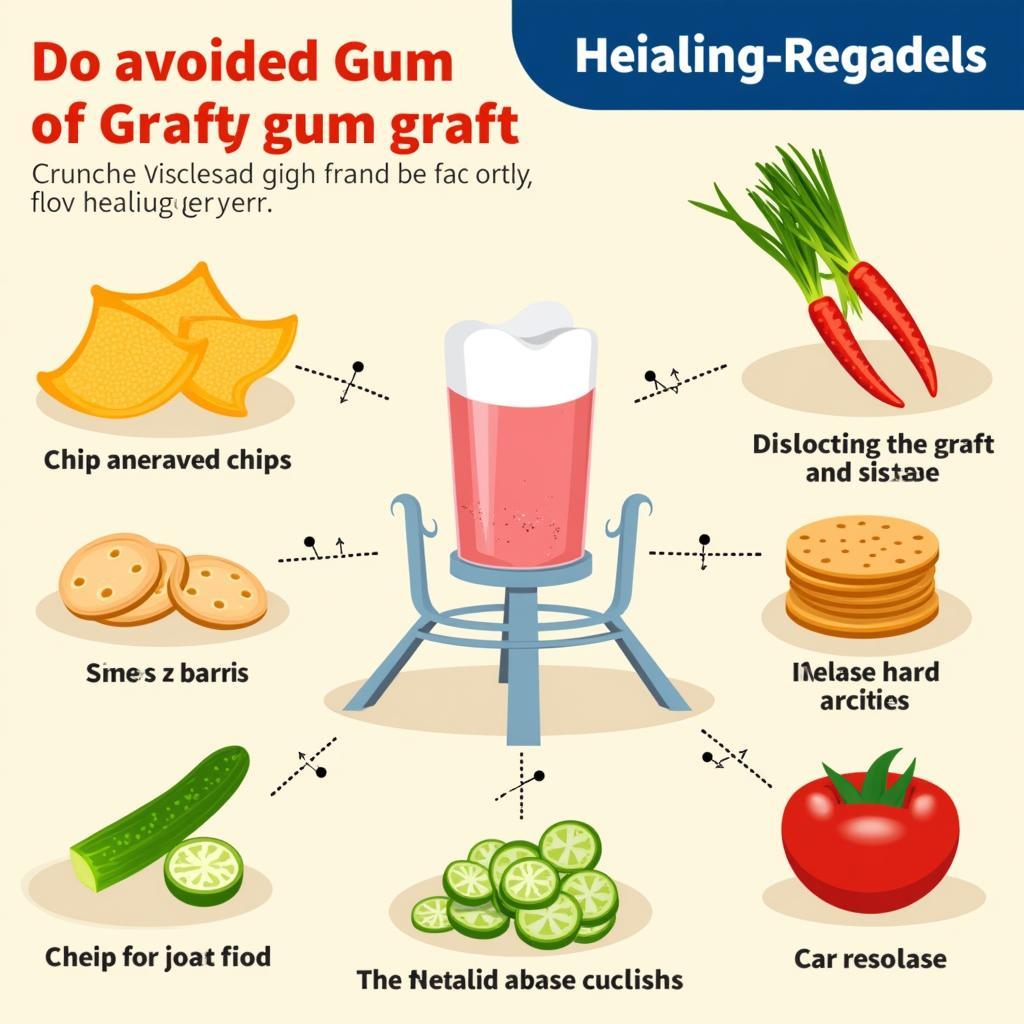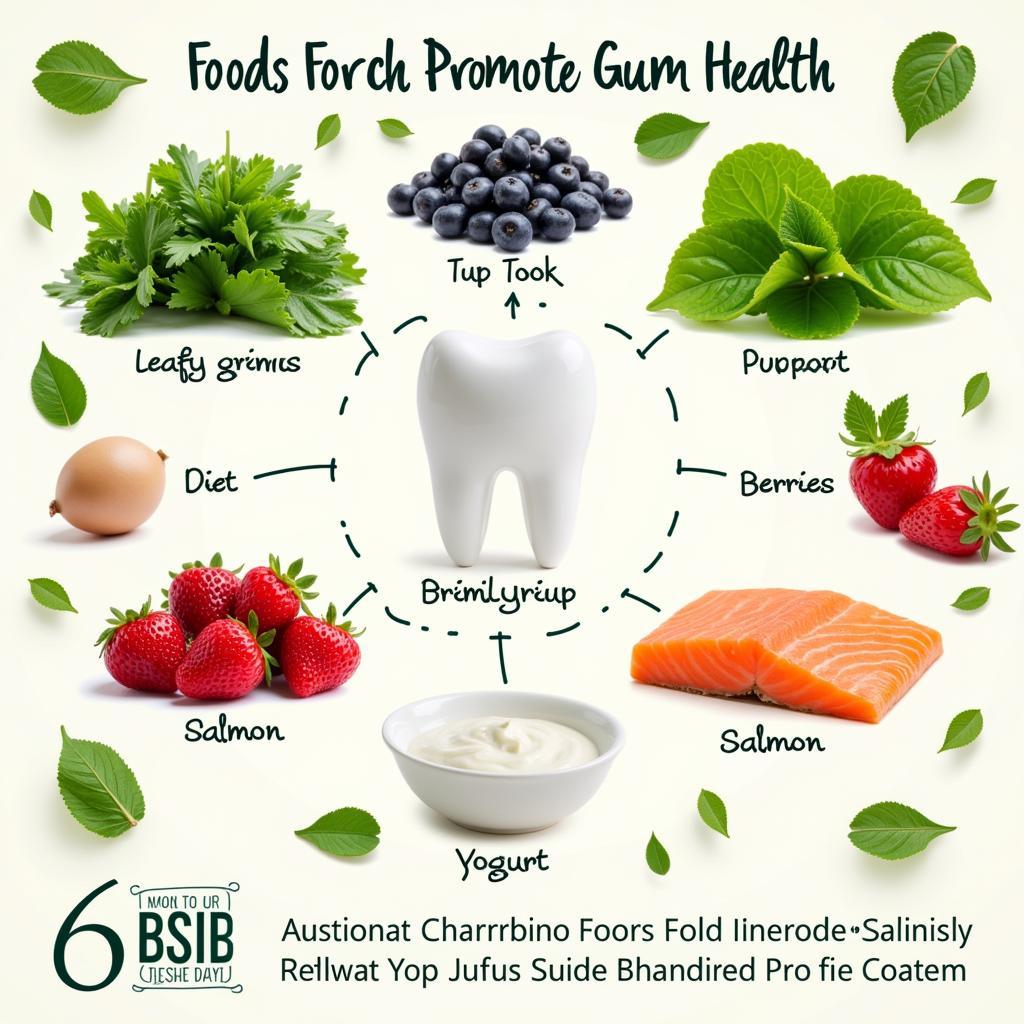Recovering from gum graft surgery requires patience and a little discipline, especially when it comes to your diet. While you’re eager to get back to enjoying all your favorite meals, certain foods can irritate the surgical site and hinder the healing process. Knowing what to avoid can make a significant difference in your comfort and recovery time. In this comprehensive guide, we’ll delve into the specific Foods To Avoid After Gum Graft Surgery and provide practical tips for a smooth and efficient healing journey.
Understanding the Importance of a Post-Surgery Diet
After undergoing gum graft surgery, your gums need time to heal and regenerate tissue. The food you consume plays a crucial role in this process. Opting for a soft food diet that’s gentle on the surgical site minimizes irritation, reduces the risk of infection, and promotes optimal healing.
Foods to Avoid After Gum Graft Surgery: Navigating the First Few Weeks
The first few weeks after surgery are the most critical. During this time, your gums are particularly sensitive and vulnerable to injury. It’s essential to avoid any foods that might dislodge the graft, cause irritation, or interfere with blood clot formation.
Crunchy and Hard Foods: The Top Offenders
Foods that require a lot of chewing, like chips, crackers, and raw vegetables, can put stress on the surgical site and potentially dislodge the graft. Additionally, small, hard particles can get lodged in the healing area, leading to discomfort and infection.
Spicy Foods: Avoiding the Burn
Spicy foods containing chili peppers or hot sauce can irritate the sensitive tissues in your mouth, causing pain and inflammation. It’s best to avoid these culinary delights until your gums have fully healed.
Acidic Foods and Drinks: Maintaining a Neutral pH Balance
Foods high in acidity, such as citrus fruits, tomatoes, and vinegar-based dressings, can disrupt the pH balance in your mouth, creating an environment that’s not conducive to healing. Limiting your intake of these foods can help promote faster recovery.
Sticky and Chewy Foods: Preventing Adhesion
Foods like caramel, gummy candies, and bagels can easily stick to the surgical site, pulling on the healing tissues and potentially dislodging the graft. Opt for softer, smoother options that won’t adhere to your gums.
Hot Foods and Beverages: Prioritizing Temperature Control
Extremely hot foods and drinks can burn sensitive gum tissue, causing pain and delaying healing. Allow your food and beverages to cool down to a comfortable temperature before consuming them.
 Avoiding Crunchy Foods After Surgery
Avoiding Crunchy Foods After Surgery
Long-Term Dietary Considerations for Optimal Gum Health
While the initial weeks after surgery require strict adherence to a soft food diet, maintaining good oral hygiene and making healthy food choices in the long term contribute to the overall success of your gum graft and your overall gum health.
Embracing a Nutrient-Rich Diet: Fueling Your Recovery
A diet rich in vitamins, minerals, and protein provides the essential nutrients your body needs to heal and rebuild tissues. Include plenty of fruits, vegetables, lean proteins, and whole grains in your diet.
Staying Hydrated: The Power of Water
Staying well-hydrated is crucial for overall health and particularly important for healing after surgery. Water helps keep the tissues in your mouth moist, flushes away food particles, and supports the body’s natural healing processes.
Limiting Sugar Intake: Preventing Plaque Buildup
Sugar feeds the bacteria in your mouth that produce acid, which can erode tooth enamel and irritate gums. Limiting your intake of sugary foods and drinks can help prevent plaque buildup and promote a healthy oral environment.
 Foods for Optimal Gum Health
Foods for Optimal Gum Health
FAQs: Addressing Common Concerns
Q: How long do I need to follow a special diet after gum graft surgery?
A: The duration of the soft food diet varies depending on the extent of your surgery and your individual healing progress. It’s best to consult with your dentist or oral surgeon for specific dietary recommendations and timelines.
Q: Can I drink alcohol after gum graft surgery?
A: Alcohol can interfere with blood clotting and delay the healing process. It’s best to avoid alcohol completely during the initial healing phase, typically for at least two weeks after surgery.
Q: When can I start brushing and flossing normally again?
A: Your dentist will provide specific instructions on oral hygiene after surgery. Generally, you can resume gentle brushing and flossing around the surgical site after a few days, but avoid direct contact with the graft.
Q: What should I do if I experience pain or discomfort while eating?
A: If you experience pain, discomfort, or bleeding while eating, stop immediately and contact your dentist or oral surgeon.
Q: Are there any supplements that can help with gum healing?
A: While a healthy diet provides most of the nutrients needed for healing, your dentist may recommend supplements like vitamin C or collagen to support gum tissue regeneration.
Conclusion
Navigating the dietary restrictions after gum graft surgery is a crucial aspect of ensuring optimal healing and long-term success. By understanding the types of foods to avoid and embracing a nutrient-rich diet, you’ll be well on your way to a smoother recovery and a healthier smile.
Remember, if you have any questions or concerns about your diet or the healing process, don’t hesitate to reach out to your dental professional.
Need more information or assistance with your oral health journey? Contact us at Phone Number: 02437655121, Email: [email protected], or visit our clinic at 3PGH+8R9, ĐT70A, thôn Trung, Bắc Từ Liêm, Hà Nội, Việt Nam. Our dedicated team is available 24/7 to provide personalized support and guidance.